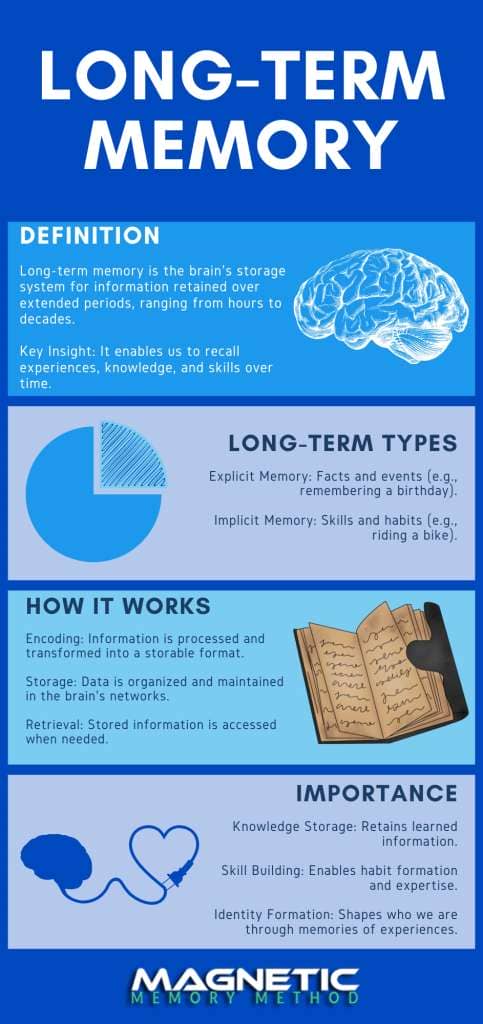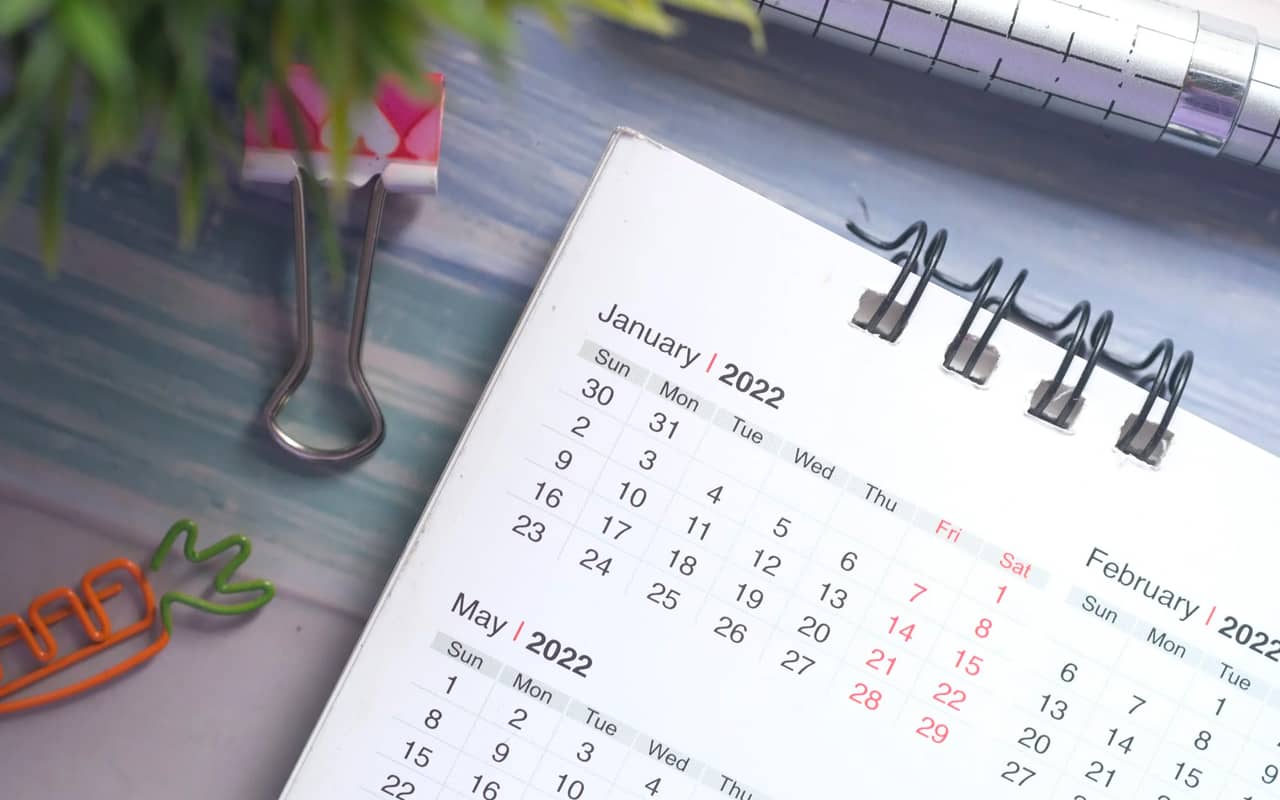Podcast: Download
Subscribe: Apple Podcasts | RSS
 It’s hard to find good info on long-term memory, isn’t it?
It’s hard to find good info on long-term memory, isn’t it?
You get drowned in difficult terminology, when all you want is to understand what it is and learn how to improve it.
On this page, you’re going to discover the different types of long-term memory in plain English.
But that doesn’t mean we’ll be skimping on the science of this type of memory. You’ll understand why scientists distinguish long-term memory from short-term memory.
We’ll also look at the sub-systems of long-term memory before turning to the most important topics of all. These are how to:
- Maintain your current long-term memory abilities
- Improve your long-term memory
- Protect all aspects of your memory for the rest of your life
So if you’re ready to increase your long-term memory capacity as you understand its many ins-and-outs, let’s dive in.
What Is Long Term Memory?
Long-term memory is ultimately about stability.
Do you remember your first day at school?
If you can get even just a small sense of where and when that event took place, that memory is relatively stable.
Likewise, if you can access visuals of the school, how you felt and the names of any teachers or friends you had at the time, this long-term memory is even more robust.
How about the meaning of a word like “justice”? If you can give a reasonable definition, then your memory of the term is a demonstration of persistence.
As before, if you can give examples of when you learned the term and how your understanding of it has changed over time, the stability of this knowledge exists on a scale.
The Categorical Nature of Long-Term Memory
But here’s what’s super-interesting about the duration of long-term memory:
It’s ultimately about categories.
For example, if you think about your visual memory (or iconic memory), you’d be tempted to think of visual memory as a whole.
But according to researchers, our long-term visual memory relies upon categories. Your brain seems to literally “tag” different visuals as if by name and then draw upon those tags later.
For example, researchers at MIT and Harvard found that the brain’s pattern recognition draws heavily upon categories like ocean, field and even more specific terms like golf course and amusement park.
When asked to remember images shown from over 160 image categories, people remembered scenes better than objects. They believe that the categorization itself explains these higher levels of recall because categories are more prominent in long-term memory.
What do these findings mean?
Well, it doesn’t mean that eidetic memory grants anyone superpowers or that photographic memory exists. (It doesn’t.)
It suggests that how memory works so fast relies upon how surfaces and icons are embedded in contexts.
The same thing is true when it comes to reading faster. Scientists have thoroughly debunked most claims about so-called “speed reading.”
But one thing the science agrees on is that you can read faster if you improve your vocabulary.
Just as people were better able to remember scenes that draw upon information in long-term memory, people with larger vocabularies read faster. Their brains draw upon long-term memory with greater efficiency because they have greater speed of pattern recognition.
Long-Term Memory Examples
Since long-term memory involves everything that persists in a stable way that you can access on demand.
As mentioned, not all long-term memories will be equally robust. But as long as you can recall something about the information you’re looking for, the memory has indeed persisted in your long-term memory.
In terms of where these memories are “stored” in the brain, scientists still disagree. Whereas some believe long-term memory and short-term or working memory follow a “single store” model, other researchers think that the location of remembered information or “mental imagery” changes over time.
With those points in mind, let’s look at some examples of long-term memory.
Procedural Memory
Probably the easiest type of long-term memory to understand is procedural memory.
Anytime you ride a bike, use chopsticks, type an email or play a musical instrument, you’re drawing upon skills that are deep in your long-term memory.
The visual pattern recognition we discussed above is highly-related here. When we look at a painting, we can determine practically on autopilot whether we’re looking at an object, portrait of a person or a landscape. There’s a procedural quality to how we understand the visual world around us.
Episodic Memory
Episodic memory is all about time. It’s personal and related to you. Anything you remember about specific events and periods of your life belong to this category:
- Getting married
- Trips
- Birthdays
- Job interviews
Although it’s different than semantic memory, there are a few relationships between the two types. For example, knowing the name of the place you got married is semantic in nature, and also carries with it episodic memories.
Semantic Memory
Everyone knows multiple facts about the world, and that’s thanks to semantic memory.
Whereas memories of different events in your life such as the recall of an anniversary belong to episodic memory, knowing the name of the country, city and street where the anniversary took place belongs to semantic memory. They are rigid facts, not episodes, which are much more fluid.
Other facts that exist in long-term memory include information like numbered addresses, years and months.
The 2 Types of Long-Term Memory
The examples of long-term memory we’ve looked at are organized into different types and sub-systems.
There two major types are:
Briefly, explicit memory is information you have to work at remembering, such as a formula for solving an equation. Implicit memory comes back to you at random, such as suddenly thinking about a concert you attended with a friend.
Either of these types of memory can be long-term.
The sub-systems are everything we’ve just talked about: procedural memory, semantic memory and episodic memory.
There are a few other sub-systems to explore, such as:
Ultimately, it’s important to understand that the science of memory is still emerging. More types of long-term memory emerge.
Or, as some scientists have proposed, the term “memory” may need to be updated, if not replaced. The larger context of cognitive ability is an important area of study to consider as you think through the definition of long-term memory.
How Long Does Long-Term Memory Last?
All good things come to an end. This means that anything that enters memory will exit it.
At least insofar as human life has an expiration date.
However, let’s think about this question philosophically for a moment.
Homer’s Odyssey was written down circa 480 BCE. The stories that were originally held in long-term memory by ancient people have survived for thousands of years. They’ll likely go on to survive for many thousands of years more.
Plus, human knowledge involves many categories. Things fold together and repeat in many different ways, meaning that we can rapidly refresh knowledge and learn new things simply by improving our pattern recognition abilities.
My personal answer then? As long as humans are here to record and activate information by reading books, watching videos and holding discussions, our memories will last.
Practically speaking, however, information lasts for as long as you maintain the knowledge through use. You also have to think about what exactly you’re trying to remember.
If you stop riding bicycles, you might still remember how to do it decades later. But if you stop speaking a language, linguistic deskilling can take place very quickly. For example, when I lived in Germany, my English skills took a nose-dive. Now that I live in an English-speaking country again, it’s my German that I have to maintain.
So as they say, use it or lose it. Anything you want to remember long-term should be kept in circulation.
How to Improve Your Long-Term Memory (and Prevent Memory Loss)
There are many ways to improve your long-term memory. These include:
- Completing a memory improvement course
- Using a Memory Palace
- Learning and practicing a Major System
Make no mistake. These are by far the best memory strategies to consider. They will also teach you a great deal about the power of deliberate practice.
When it comes to preventing the loss of memory skills you already have, practice is the key, but also things like:
- Eating memory friendly foods
- Taking care of your sleep
- Getting lots of time in with friends
- Daily physical exercise (for example, yoga)
- Daily brain exercise
Specific, Long-Term Memory Exercises
Ultimately, to improve and maintain long-term memory, we should focus on exercises and tasks that exercise this specific skill.
It’s best to get started sooner than later. Don’t wait for signs of Alzheimer’s or other signs of memory loss to emerge, such as:
- Confusing the names of loved ones
- Forgetting aspects of your life
- Losing track of objects
- Struggling with terminology and even basic vocabulary
- Getting lost
We know from many studies that bilingualism is one way to fend off such problems. But not everyone is going to invest the time into learning another language.
So let’s look at some activities you can do that will exercise your long-term memory, grow its strength where needed and keep it sharp for life.
One: Keep a Memory Journal
It’s long been known that keeping a journal improves mental health. As Richard Wiseman reports in 59 Seconds, it can also help extend your experience of time.
When it comes to tracking your memory activities, it’s also an incredibly powerful activity.
You can keep your Memory Palaces gathered in one spot, set goals and reflect on your progress. And as you continue jotting down aspects of your life, you’ll get the benefits of remembering more of your life because you’ve increased your observation skills with daily practice.
The reason it works is probably because the more information you practice with that is inherently long-term in nature, the more your long-term memory gets exercise.
Two: Memorize Mantras
Although this technique won’t be for everyone, it’s a great way to give your long-term memory a workout.
I’ll share my approach to this, a practice I started in 2017.
Using Memory Palaces, I started committing long form texts in Sanskrit to memory. Like beading a necklace, I keep adding line after line, after reciting the entirety of what I’ve memorized.
Because there’s an intellectual component to the material that involves understanding a fairly simple, yet robust philosophy, memory improves as critical thinking skills also enjoy a boost.
Three: Expand Your Thinking Skills
A lot of people turn to games to give their memory a workout. The problem is that a lot of those games only make you better at playing the game. The skills don’t transfer to other aspects of life.
But when you complete critical thinking exercises regularly, you’re doing something similar to working with mantras. You’re rehearsing what you’ve placed in long-term memory while also adding new knowledge.
Four: Exercise Your Episodic & Semantic Memory Together
Remember how I said that there’s a difference between remembering a birthday party and remembering the city and street name where the party took place?
Well, a great way to exercise your memory is to think about different episodes of your life, then write down as many semantic pieces of information as you can.
In your Memory Journal, write out a list of all the birthday parties you can remember – both your own and those of family and friends. Write out some of the details you remember in terms of what happened.
Next, give your semantic memory a workout. List the year, the location and any other facts that come to mind. What shows were on television at that time? Popular movies? Music that you liked?
As an example, I remember a birthday party where we stayed up all night and had ice cream cake from Dairy Queen. That’s the episodic part.
For the semantic part, I list out the names of the friends who attended and facts like the year being 1987 and that Kiss’ Crazy Nights came out.
Five: Live a good life
This tip is easier said than done, but could anything be more true?
Lying, cheating, stealing and other crimes are destructive because they make remembering hard to bear.
But focusing on being a truthful person who contributes to your community produces countless rewards.
Note that it doesn’t have to be epic amounts of contribution. Just doing what you can to be a force of good promotes long-term memory benefits because you’re giving yourself plenty of material worth remembering.
Six: Take On Large Learning Projects
Studying information in-depth helps your brain create more connections.
I suggest you pick a topic you’re passionate about and read 3-5 books on the topic. Even if some of the material might feel repetitive, you learn a lot by seeing how different people approach the same topics. Plus, you get some natural repetition that helps reinforce key ideas.
Also, spend some time reading topics that are outside of your comfort zone. For example, I was quite nervous about reading into computation. I didn’t think I’d be able to wrap my mind around it.
But I persisted by simply reading and letting understanding arrive gradually. Soon, my brain started making connections and now I have a new point of reference that will build even more connections as I continue to cross-reference new information with this growing knowledge-set.
When it comes to long-term memory, the more you know, the more you can know.
Seven: Learn Hands-Based Skills Like Arts & Music
Our brains benefit so much by developing procedural memory skills. Drawing, painting and playing musical instruments are incredibly useful. It’s delightful to draw upon the skills you’ve developed over the long-term and you can always improve them. There is literally no ceiling.
The beautiful thing about these skills is that you can combine study and practice. For example, I’m taking a jazz bass course at the moment. In addition to getting the instrument in my hands and learning more about chord tones and arpeggios, I am also reading books about the history of the genre.
If you were learning to draw, it would be easy to also add on a few books about the lives of various artists to embed the procedural memory skill in knowledge that develops both your episodic and semantic memory.
Build Your Own Long-Term Memory Systems
Now that you know what long-term memory is and how it works, take a hands-on approach to developing it.
One of the best things you can do is dedicate yourself to practicing the ancient art of memory. Developed when people needed to carry entire books in their minds because they couldn’t carry them on their backs, it is designed to address long-term memory development.
If you’re interested in learning how to use it, register for this free Memory Improvement Course:
It will give you worksheets and four videos that give you a foundational course in these techniques.
And since the skills are so fun to use and instantly rewarding, you’ll wind up using them for life.
So what do you say? Are you ready to take the future of your memory into your own hands?
Enjoy the journey and just shout out if you have any questions along the way!
Related Posts
- Long-Term Memory Loss: 5 POWERFUL Prevention Tips
What is long-term memory loss? What are its causes, symptoms, and how do you prevent…
- Memory Athlete Braden Adams On The Benefits Of Memory Competition
Braden Adams is one of the most impressive memory athletes of recent times. Learn to…
- On Math, The Science Of Mnemonics And Memory Modalities
Candid talk on the science of mnemonics with notes on math and rep systems.













